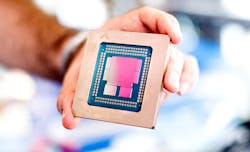AWS Graviton3 Instances Showcase the Power of Custom Cloud Chips
Cloud computing has transformed many elements of IT operations, changing the way companies add capacity and pay for it. One area where cloud has been a game changer is the hardware refresh – the tech industry ritual of buying new servers to take advantage of newer, faster processors. Gone are the days of buying and shipping physical servers and then installing it in a data center. Cloud platforms now design and deploy custom hardware, allowing the IT refresh to be driven by changes in a software console.
The power of that model is showcased this week by Amazon Web Services, which has rolled out new processors to offer better performance and energy efficiency for power users. AWS this week announced the availability of C7g server instances, which are powered by new Graviton3 processors based on the Arm architecture, which has brought low-power computing to mobile devices. Amazon says the new processors, developed in-house, represent a major advance in price and performance over its current Graviton 2 processors.
“I believe the 25% generational performance gain we’re delivering in Graviton3 will be a big step forward for customers,” said James Hamilton, Distinguished Engineer at AWS, who provided a detailed overview of the new chips and their importance.
Hamilton, who has a long history of server innovation at AWS and Microsoft, cited Graviton3 as an example of how custom engineering by cloud companies has changed the game for customers.
“Scale supports innovation at every level,” said Hamilton. “We’re now a leading semiconductor design house. We do custom servers, custom storage racks, our own networking equipment, and of course the AWS service stack.”
Google was the first of the hyperscale data center operators shift to custom hardware design, followed by Microsoft. In 2011 Facebook launched the Open Compute Project, an open hardware movement to create efficient hardware for the hyperscale sector.
After relying on server vendors like Rackable in the early years of its cloud service, AWS began its own custom silicon operation, with an early focus on application-specific chips to accelerate its network. networking. It has also developed specialized chips for artificial intelligence (AI) workloads, including configurations optimized for training and inference.
Advancing the Price-Performance Equation
Graviton 3 is Amazon’s general purpose processor for the AWs Elastic Compute Cloud ((EC2), which provides virtual servers, or instances, that can be configured for computing tasks using Amazon Machine Image templates.
The new C7g instances are the 7th generation of compute instances (the C) based on Graviton (the g). AWS says they provide up to 25% better compute performance for compute-intensive applications, including 2XS faster performance for scientific and crypto workloads, and even larger gains for machine learning. For a deeper dive, check out Hamilton’s 9-minute video overview:
A key selling point is the ability to use 60 percent less energy for equivalent compute power, according to Hamilton, which will be of interest to customers focused on sustainability and reducing their carbon impact.
Enabling A Bigger Role for Arm
The AWS Graviton3 rollout illustrates how the cloud has enabled broader use of low-energy processors based on the Arm architecture. Arm has been widely used in mobile devices like iPhones and iPads, but has had a winding path to the data center.
One issue has that software code written to run on x86 processors must be modified to work on an ARM platform. That was a particular barrier for enterprises with many legacy applications, but is somewhat simpler matter at the cloud level.
“(A) question I receive is: given that Graviton instances are based on Arm architecture, how difficult is it to migrate from x86?” wrote Sébastien Stormacq, Principal Developer Advocate at Amazon Web Services, in a blog post about the C7g launch. “Graviton3 instances are supported by a broad choice of operating systems, independent software vendors, container services, agents, and developer tools, enabling you to migrate your workloads with minimal effort.
Applications and scripts written in high-level programming languages such as Python, Node.js, Ruby, Java, or PHP will typically just require a redeployment, Stormacq said, while applications written in lower-level programming languages such as C/C++, Rust, or Go will require a re-compilation. There are also many AWS managed services based on Graviton.
C7g instances are initially available in US East (N. Virginia) and US West (Oregon) AWS Regions, with other regions will be added “shortly after launch,” AWS says.
About the Author



